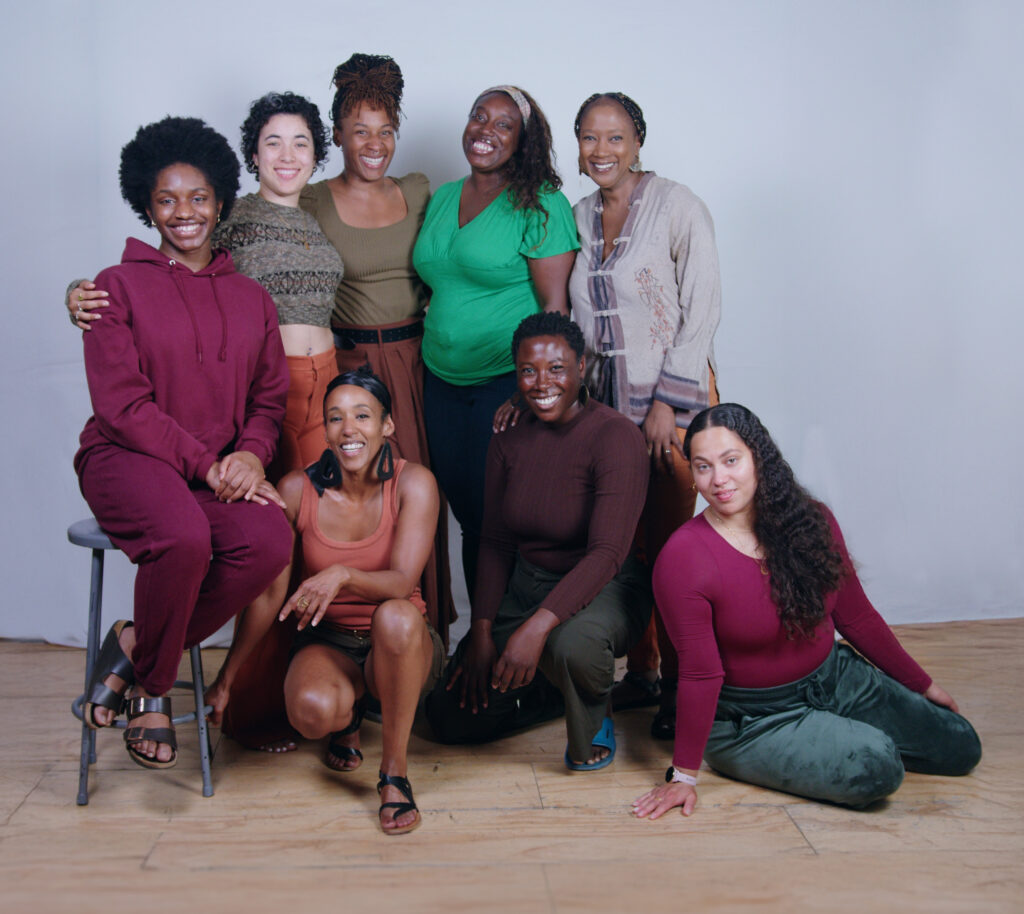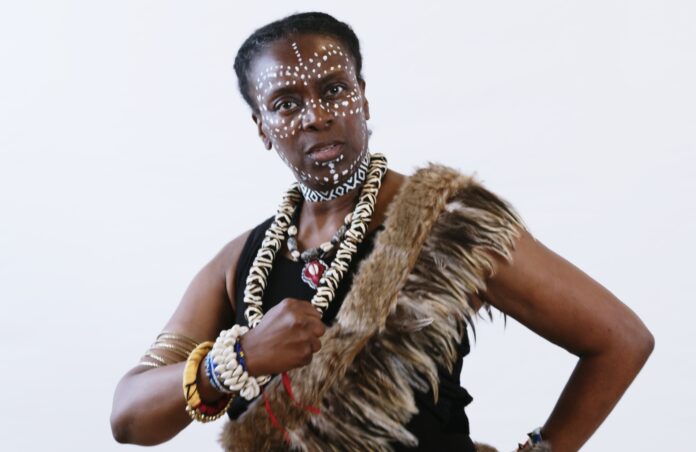Oakland Theater Project’s presentation of Les Blancs (The Whites) arrives July 11-27 at a critical time in US history. Playwright Lorraine Hansberry’s final work, adapted and completed after her death by her husband Robert Nemiroff, tells a story set in an African village and delves into the incendiary dynamics of white colonization on the African continent in the late 19th and early 20th centuries.
Tshembe, a Black man who has found success as a businessman in England, returns to his native home upon the death of his father. Immediately, he confronts questions about his identity and if it is ever possible to exist safely, but without compromise, in superimposed systems and structures not built for him and people of his race and ancestry.
Thrusting like an arrow to pierce the outer shell of political forces that sought then—and still seek now—to marginalize and silence anyone advocating liberation, OTP’s production is led by director James Mercer II. Importantly, the protagonist Tshembe, and other Black and white characters in Mercer’s version are portrayed by an eight-member cast of all Black women actors: Jeunée Simon (a Best of the Bay 2022 winner), Aidaa Peerzada, Rezan Asfaw, Brittany Sims, Champagne Hughes, Monique Crawford, Jacinta Kaumbulu, and Success Ufondu.
Collectively, they speak the story of transformation, resolve, and reclamation from the perspective of the one Black woman in the original play. “The Woman” was a spirit woman who never spoke directly in Hansberry’s rendition. Given full voice by Mercer through a narrative diaspora that could be called a prismatic Mother Africa, her blazing energy and life force is fully embodied by the eight actors.
Simon, who plays the role of Tshembe, says her earliest thoughts centered on the moment Tshembe was set adrift as an adult orphan—with his father’s death, both of his parents are deceased. She asked herself, “What is your tie to your ancestry? What is your future that you envision? Who does he want to be? How does he exist in the system not made for him? Does he run from it, bargain with it, try to burn it down and start afresh?”
Asked what she discovered while unraveling the role about her own identity as a Black woman, professional actor, certified coach, trained consent educator and intimacy director, Simon laughs. She turns to a line from the play itself.
“There’s a part where Tshembe says, ‘You thought since I was a Black man that I’d have answers that are deep and pure?’ In the same way, I don’t know that I have answers that are deep and pure for you. I enjoy this play because it helps me to connect with an ensemble of amazing Black women and be led by James Mercer, an amazing Black director.
“We get to explore this world. To show up, be in that theater, and tell this story, is a victory. I will take those little victories of being able to be present, use my voice, and create a world where people can sit in a dark theater and learn and collectively feel something. That’s my purpose and something I’ll always delight in.”

Several roles Simon has played in previous productions and acting methods she has studied such as the Meisner Technique inform her approach to Tshembe. “We’re always playing roles that are physically outside of ourselves, unless the work is autobiographical. I did a show ‘The Last Days of Judas Iscariot’ with Luminous Collective, directed by Michael French. I got to play four to five characters. They had to be so distinct in terms of physicality and voice.”
Of Tshembe, Simon says, “This man has a swagger, a White, European wife, and a fashionable life he’s making in England. Then, he has to come home and learn who he is. He grew up in a pond, moved to a different pond, and comes back to feel the world on his skin, to feel the weight of the world, to feel like a fish out of water. Who will he be (when) the water gets more and more murky?”
In Simon’s treatment, Tshembe moves lightly upon arrival, but is pulled down and in other ways altered as the harsh environment rolls across, through, underneath and beyond him. Throughout, his voice takes up tremendous space, giving the impression he is engaged in a perpetual, conversational chess game. “Speaking with himself and to another character, he is debating. They’re talking about ethics, trying to trip each other up,” Simon says. “I had the privilege of playing Richard II at Magic Theatre last year and there’s something about Shakespearian language that reminded me inflections can be heard. You can go up, down, like a wave you’re riding.”
Hansberry didn’t specify an actual African country where the play was set, which had the cast and director researching and choosing to reflect multiple regions. “There’s freedom within dialects on the continent, and more play than we can do with American English. We get to explore the many qualities of voice, pitch, and tone at our fingertips.”
Experiences beyond the stage contributed to Simon’s artistic growth and capabilities. “During the pandemic, we did so much theatrical recording from our own homes. I relearned how to use my voice in isolation as a tool. Remembering to communicate through pitch and tone—that’s all people were hearing—has done a great service for actors returning to the stage.”
Simon also began working as an intimacy director in 2020. Defining her priority as creating “spaces where you know what the container is so you can be as brave as possible,” she begins every collaboration with play. “We know what’s possible and and build (on that). Communication is so hard. It’s amazing that we attempt to formalize what we’re saying in our heads and communicate it to another person. Across that divide, they have to hear it and through their own lenses, interpret what it means. Then, we come to consensus. If we’re moving in two different directions, we need to get on the same page. How can we effectively communicate, ask the right questions, and move forward in alignment? It takes work.”
The work of Les Blancs and delivery of a message of heightened importance for audiences in 2025 has Simon contemplating the responsibilities and power of her craft. “The responsibility of live theater, not to say art in general, is to reflect reality and to inspire us on our path forward. That is what Les Blancs does. All of the theater I’ve done the past year has been within the question of how to deal with our reality. Social media is not the world I often engage in because I was overwhelmed seeing hateful comments. I didn’t invite that into my home and I have barriers around it.”
Even so, Simon keeps steady eyes on the world. “We’re seeing rights stripped away, individuals being persecuted, fear that started during covid, people scared, people hurting each other, trying to advance themselves at the expense of others. Giving voice to the woman in Les Blancs who you saw but never heard, how do we give voice to the marginalized and see they’re part of the solutions? Let’s start with listening to the marginalized and re-envision the world. That’s what theater can do.”
Bolstering her belief in theater’s ability to uplift, unify, and examine the world, is Tshembe. His voice reminds Simon and anyone willing to listen that in an antagonistic world, it is possible to stay sane, continue to work, refuse to sacrifice ancestry, country, safety, and identity, to be heartened, to speak and be heard. “All of the theater we’re seeing and conversations we’re having at this time are a reminder we should not ever be silent.”
LES BLANCS plays July 11-27 at Oakland Theater Project, inside FLAX, Oakland. More info here.





